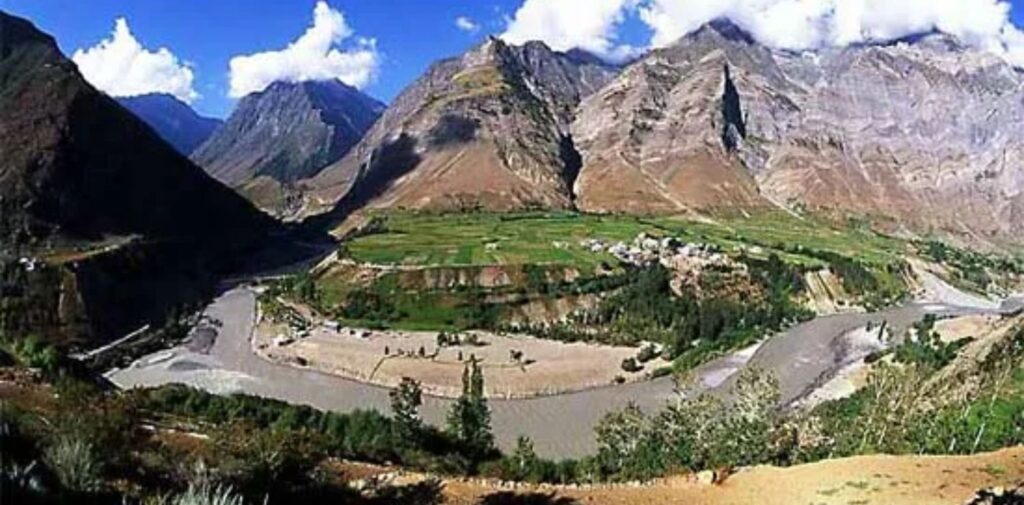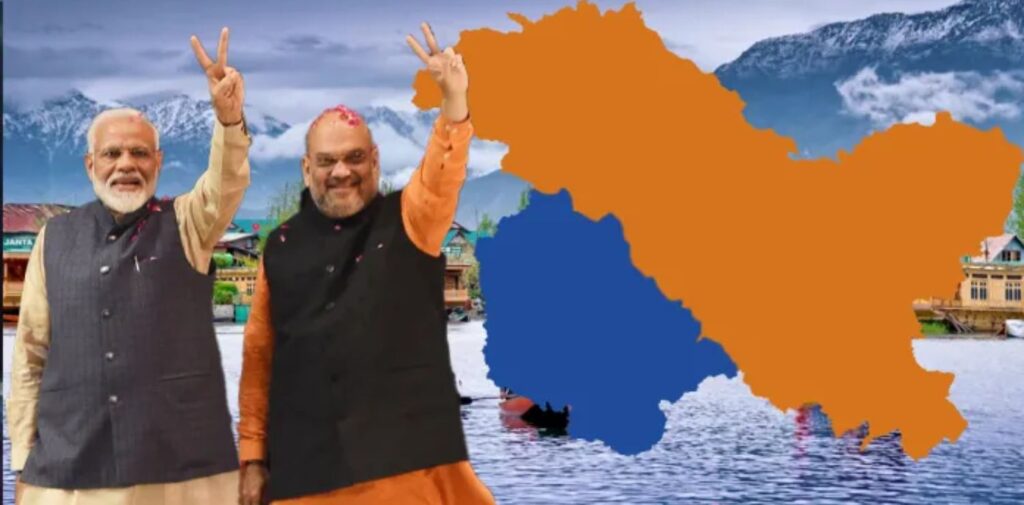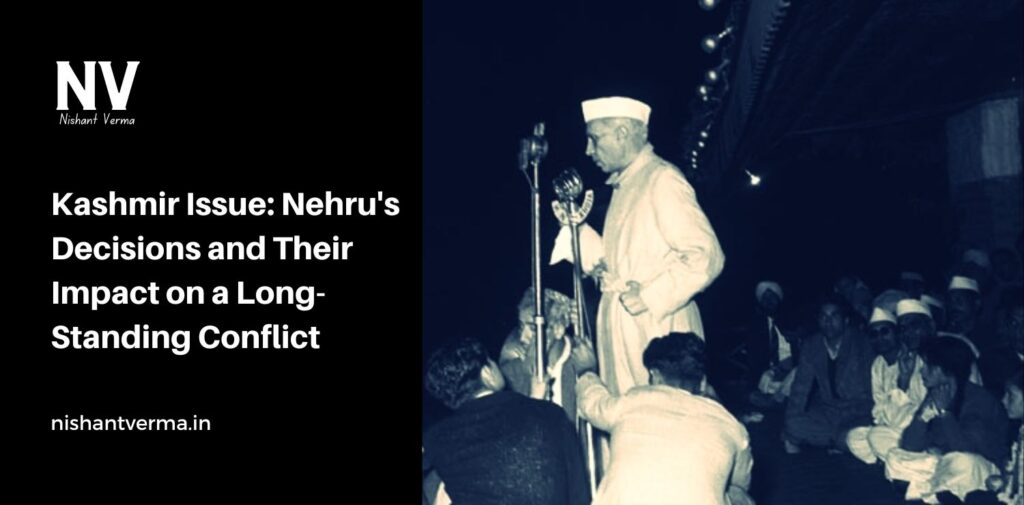The Kashmir conflict is one of the most significant and long-lasting issues in the history of South Asia. For decades, the region has been at the center of tensions between India and Pakistan, with the people of Kashmir caught in the middle. At the heart of this conflict lies the decisions made by India’s first Prime Minister, Jawaharlal Nehru, and how his policies have shaped the dispute in ways that continue to affect the region today.
In this article, we will look at the Kashmir issue, how Nehru’s decisions led to the current situation, and how the past still impacts India, Pakistan, and the people of Kashmir.

A Brief Overview of Kashmir’s Importance
Kashmir is a beautiful region, rich in culture, history, and natural resources. It is situated at the northernmost part of the Indian subcontinent and shares borders with both India and Pakistan. The region is strategically important due to its location, as well as its abundant water resources, which are vital to both India and Pakistan.
In 1947, when India gained independence from British rule, the princely state of Jammu and Kashmir was one of the many princely states that had to decide whether to join India or Pakistan. This decision would eventually set off a chain of events that led to the ongoing conflict we see today.
The Beginning of the Conflict: 1947 Partition
In 1947, when India and Pakistan were created as two separate nations, Kashmir was a princely state ruled by Maharaja Hari Singh. The Maharaja was a Hindu ruler in a majority Muslim region. He was faced with a tough decision on which country to join, India or Pakistan. The majority of Kashmir’s population was Muslim, and Pakistan wanted the state to join them, while India, led by Jawaharlal Nehru, also wanted Kashmir to be part of India.
The decision became more complicated when tribal militias from Pakistan invaded Kashmir, leading to violence and unrest. The Maharaja, in a desperate attempt to defend his kingdom, asked India for military help. India agreed to send troops, but only on the condition that Kashmir would accede to India. In October 1947, the Maharaja signed the Instrument of Accession, agreeing to join India, but this decision sparked anger in Pakistan, which claimed Kashmir should have been theirs due to its Muslim majority.
Nehru’s Role and the First War
Once Kashmir became part of India, the conflict escalated into the first war between India and Pakistan in 1947-48. The war was fought over control of Kashmir, with both India and Pakistan sending their armies to take control of the region. The war ended in 1948 with the intervention of the United Nations, which called for a ceasefire and a division of the region.
However, the UN’s involvement didn’t solve the problem. It called for a plebiscite (a vote by the people) in Kashmir to determine whether the people wanted to join India or Pakistan. But the plebiscite never took place, and the region remained divided between Indian-administered Jammu and Kashmir, Pakistan-administered Azad Kashmir, and Gilgit-Baltistan.
Nehru’s Approach: The Promise of a Plebiscite
Jawaharlal Nehru’s government played a crucial role in the early days of the Kashmir conflict. In 1948, Nehru promised that a plebiscite would be held in Kashmir so the people could decide their future. Nehru believed that Kashmir’s majority Muslim population would choose to remain with India, as the state had special provisions that gave it a great deal of autonomy. However, the plebiscite was never held, mainly due to the ongoing tensions with Pakistan, and the issue became a political and military deadlock.
Nehru’s promise to hold a plebiscite was a significant part of his diplomatic approach to Kashmir. He believed that the people of Kashmir should have the right to decide their own future. However, as time passed, the situation became more complicated. Pakistan continued to press for the plebiscite, while India maintained that the region was an integral part of India and that there was no need for a vote.

The Aftermath: Special Status for Jammu and Kashmir
In addition to the promise of a plebiscite, Nehru’s government also granted Jammu and Kashmir special status within India. This special status was enshrined in Article 370 of the Indian Constitution, which gave the state a high degree of autonomy. The state could have its own laws, a separate constitution, and control over most matters, except defense, foreign affairs, finance, and communications.
This special status was meant to give the people of Kashmir a sense of independence and security within India. However, over time, this provision became a source of contention. Many people in Jammu and Kashmir felt that India had not kept its promises, while many Indians outside the state felt that Jammu and Kashmir’s special status was unfair and created divisions within the country.
The Kashmir Conflict Deepens
The Kashmir issue did not end with the first war. In fact, it became a long-standing conflict with numerous wars, military standoffs, and political tensions. In 1965, another war broke out between India and Pakistan over Kashmir, but this time it ended with a ceasefire brokered by the United Nations.
In the 1970s and 1980s, the situation worsened as militancy and insurgency spread in the region. Many people in Kashmir, particularly in the Muslim-majority areas, began to demand independence or the merger of the region with Pakistan. This demand was fueled by feelings of alienation, economic hardship, and political frustration with both India and Pakistan. Armed insurgents started fighting against Indian rule, leading to widespread violence and human rights abuses.
India responded with military action to suppress the insurgency, and the region became a war zone. Thousands of people have died in the violence, and the region remains heavily militarized to this day. The people of Kashmir have continued to live with uncertainty, fear, and violence, with no clear resolution to their future.
Nehru’s Legacy and Its Impact
Nehru’s decisions in the early years of independence and the Kashmir conflict laid the groundwork for the prolonged dispute. His promise of a plebiscite and the special status given to Jammu and Kashmir created expectations that were never fully realized. By not holding the plebiscite or resolving the issue permanently, Nehru left a deep divide that Pakistan and India continue to struggle with today.
The failure to resolve the Kashmir issue during Nehru’s time was compounded by the continuing military and political confrontations between India and Pakistan. As time passed, the Kashmir conflict became more entrenched, and the people of the region suffered the most.

A Stubborn Problem
The Kashmir issue is not just a territorial dispute between two countries; it is a deeply human issue. The people of Kashmir have lived through decades of violence, political uncertainty, and a lack of basic rights. While India and Pakistan continue to argue over the region, the voices of the Kashmiri people are often lost.
Nehru’s decisions, though well-intentioned at the time, created a situation that was difficult to resolve. The promise of a plebiscite, which never took place, led to a sense of betrayal among the people of Kashmir and raised expectations that could not be met. The region’s special status, while providing some level of autonomy, also sowed the seeds of division and unrest.
Conclusion: Moving Forward?
The Kashmir issue remains one of the most challenging conflicts in modern history. The decisions made by Jawaharlal Nehru in the early days of Indian independence set the stage for the prolonged dispute that has lasted more than seven decades. While Nehru’s intentions were to protect the rights of Kashmiris and provide them with a peaceful future, his policies left the region deeply divided and unresolved.
The conflict is far from over, and it continues to affect not only India and Pakistan but also the people of Kashmir, who long for peace and stability. As the world looks for a way to resolve this issue, it is clear that the legacy of Nehru’s decisions will continue to shape the future of Kashmir for years to come.




